ABRAHAM SEPARATES FROM LOT
In chapter 13 we see the return of Abram from the land of Egypt. Abram and Lot leave Egypt and return to the Land of Promise. Lot separates from Abram and goes to Sodom, and then God appears to Abram for the third time.
As long as Abram is in the land of Egypt and as long as he is still holding on to Lot, God does not appear to him. The minute that he comes back to the land and there is the separation from Lot, God appears to him.
Genesis 12 ended with Abram and his large company being kicked out of Egypt by an angry Pharaoh. Back in Canaan, Abram and his nephew Lot are forced to split up due to the large size of their herds.
Lot’s choice to live near the wicked city of Sodom will have grave implications in coming chapters. God reaffirms and expands on His promises to Abram, who settles near Hebron, building another altar to the Lord and worshiping God there.
Genesis 13:1-9 KJV
[1] And Abram went up out of Egypt, he, and his wife, and all that he had, and Lot with him, into the south.
[2] And Abram was very rich in cattle, in silver, and in gold.
[3] And he went on his journeys from the south even to Beth–el, unto the place where his tent had been at the beginning, between Beth–el and Hai;
[4] Unto the place of the altar, which he had made there at the first: and there Abram called on the name of the LORD.
[5] And Lot also, which went with Abram, had flocks, and herds, and tents.
[6] And the land was not able to bear them, that they might dwell together: for their substance was great, so that they could not dwell together.
[7] And there was a strife between the herdmen of Abram’s cattle and the herdmen of Lot’s cattle: and the Canaanite and the Perizzite dwelled then in the land.
[8] And Abram said unto Lot, Let there be no strife, I pray thee, between me and thee, and between my herdmen and thy herdmen; for we be brethren.
[9] Is not the whole land before thee? separate thyself, I pray thee, from me: if thou wilt take the left hand, then I will go to the right; or if thou depart to the right hand, then I will go to the left.
Genesis 13:1 KJV
And Abram went up out of Egypt, he, and his wife, and all that he had, and Lot with him, into the south.
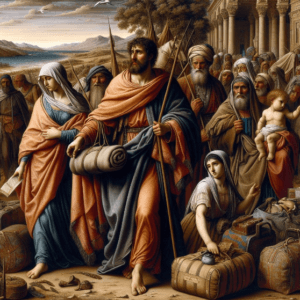 If Abraham went “down” into Egypt in 12:10, Grace brings him “up” out of Egypt, as recorded in this Verse; they left the south to go north, back to Canaan.
If Abraham went “down” into Egypt in 12:10, Grace brings him “up” out of Egypt, as recorded in this Verse; they left the south to go north, back to Canaan.
Abram and his company were forced to enter the land of Egypt in search of food in a time of famine. Now they have been sent back out of Egypt by an angry Pharaoh.
God had afflicted Pharaoh’s household with a plague, because Pharaoh took Abram’s wife Sarai for his own wife. This incident was caused by two factors. The first was Sarai’s great beauty (Genesis 12:14).
The other was Abram’s decision to tell a lie in the form of a half-truth: that Sarai was his sister (Genesis 12:13). This was Abram’s cowardly attempt to keep jealous men from attacking him in order to have access to Sarai (Genesis 12:12).
Even though Abram lied, God intervened to protect His own plan for Abram and Sarai’s lives. In short, Abram had been faithless, but God had proved Himself faithful.
Abram had even become wealthier, leaving Egypt with all the goods Pharaoh gave to him when taking Sarai for his own. Now the company arrives back in the desert-like area of the Negeb (or Negev), in the southern part of the land of Canaan.
Genesis 13:2 KJV
And Abram was very rich in cattle, in silver, and in gold.
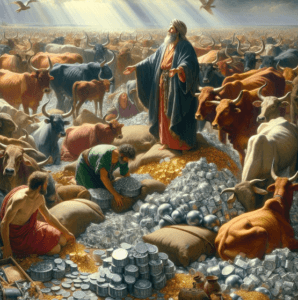 These were the Blessings of God, but it did not make up for his lapse of Faith. Abram was the John D. Rockefeller of that day. He was a very wealthy man at this time.
These were the Blessings of God, but it did not make up for his lapse of Faith. Abram was the John D. Rockefeller of that day. He was a very wealthy man at this time.
Even prior to the incident in Egypt, it was clear that Abram was wealthy (Genesis 12:5). Now we’re told that he is very rich, specifically in livestock, silver, and gold. This is the first mention of Abram possessing gold and silver.
It is likely that Abram became much wealthier during his stay in Egypt. For one thing, Genesis 12:16 tells us that Pharaoh had treated Abram well and had given to him many animals, as well as human servants, when he took Sarai for his own wife.
It is likely that Pharaoh allowed Abram to keep all he had given, and may have given him more, in light of his nearly-adulterous relationship with Sarai.
Pharaoh would have been motivated to appease Abram’s God, as well as getting Abram out of the country, to end the plague on his household.
So even though Abram failed to trust God, instead choosing to lie to protect himself, God was faithful to Abram in the end, both protecting and profiting him.
Genesis 13:3 KJV
And he went on his journeys from the south even to Beth–el, unto the place where his tent had been at the beginning, between Beth–el and Hai;
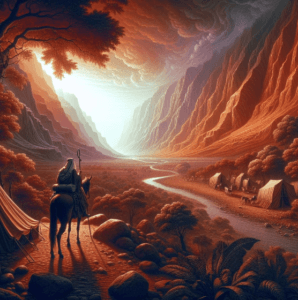 Abram went far north of Jerusalem. He had come to the south, around Hebron, and now he goes north of Jerusalem to Bethel.
Abram went far north of Jerusalem. He had come to the south, around Hebron, and now he goes north of Jerusalem to Bethel.
After being forced out of Egypt by an angry Pharaoh, wealthy Abram and his company traveled north through the Negeb, then farther north up into the heart of Canaan.
In truth, they were journeying back up the way they had come down, arriving back in the area of Bethel. This is the same spot, between Bethel and Ai, where they had lived for a time after arriving in Canaan.
As we’ll be reminded in the following verse, this is the spot where Abram had previously built an altar and called on the name of the Lord. It’s possible Abram came here specifically because he was hoping to hear from God once more.
Genesis 13:4 KJV
Unto the place of the altar, which he had made there at the first: and there Abram called on the name of the LORD.
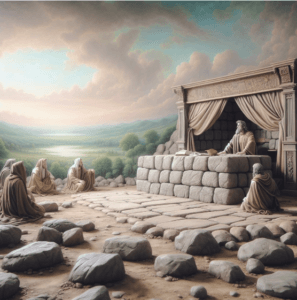 He went back to the mountaintop where his tent had been at the beginning, and there, doubtless with tears and shame, he called by Sacrifice on the Name of the Lord.
He went back to the mountaintop where his tent had been at the beginning, and there, doubtless with tears and shame, he called by Sacrifice on the Name of the Lord.
His backslidings were forgiven, his soul was restored, and he resumes his true life as a pilgrim and a worshipper with his tent and his Altar, neither of which he had in Egypt.
Until the Believer comes back to the Cross, of which the Altar is a Type, true Restoration cannot be found.
In the previous verses, Abram and his company left Egypt behind and travelled north, arriving at their former campsite between Bethel and Ai. This was after being given great wealth by Pharaoh, over his desire for Sarai (Genesis 12:10–20).
In particular, Abram seems to be returning to the altar he had built during their previous stay in the region (Genesis 12:7). Again, Abram used this altar to call on the name of the Lord.
We’re not told so, but it’s possible that Abram used the altar to make animal sacrifices to the Lord as a way of worshiping Him. Perhaps Abram was hoping to hear from God again about what next steps he should take.
Genesis 13:5 KJV
And Lot also, which went with Abram, had flocks, and herds, and tents.
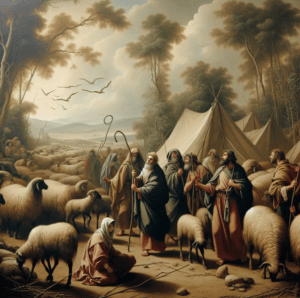 Lot didn’t seem to realize that his blessings were strictly because of Abraham.
Lot didn’t seem to realize that his blessings were strictly because of Abraham.
Abram left Egypt as a wealthy man, with a large entourage. This company included his wife, his nephew Lot, various kinds of livestock, other animals, and male and female servants.
Together, they had traversed from Egypt north all the way to the heart of Canaan, arriving at Bethel and the altar to the Lord Abram had previous built.
Here we learn that Lot also had his own wealth, including flocks and herds and tents. In the following verses, we’ll learn that Lot was, in fact, very affluent in his own right.
It’s unclear how much of this property Lot entered into Canaan with and how much he might have picked up in Egypt. What is clear is that God was abundantly blessing Abram and all who were with him.
As it turns out, these blessings will set up the narrative of next few chapters. Abram and Lot will need to separate in order for their families to thrive. This leads Lot into several incidents of trouble, where he has to be rescued.
Genesis 13:6 KJV
And the land was not able to bear them, that they might dwell together: for their substance was great, so that they could not dwell together.
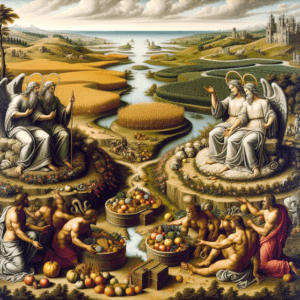 Worldly substance generally causes problems, even as it did here. There was strife in the Church. In fact, the “Church” of that day consisted of the families of Abraham and Lot, at least as far as we know.
Worldly substance generally causes problems, even as it did here. There was strife in the Church. In fact, the “Church” of that day consisted of the families of Abraham and Lot, at least as far as we know.
Abram’s large company of travelers included Lot, his nephew. God’s blessing on Abram extended to Lot, who had also become quite wealthy in flocks and herds and servants.
In fact, God’s blessing was so great that the land could not support Abram’s and Lot’s possessions living near each other. They would soon exhaust all the local resources.
The following verses will make clear that Abram and Lot were going to need to separate and spread out from each other. This development will set up the events of the next several chapters.
Lot will choose to live close to the rich—but infamously wicked—city of Sodom. Lot’s wealth will result in his own kidnapping, and a rescue by Abram (Genesis 14:1–16).
Pursuit of wealth will also lead Lot to an eventual life within Sodom itself, necessitating a rescue when God judges the city for its sin (Genesis 19).
Genesis 13:7 KJV
And there was a strife between the herdmen of Abram’s cattle and the herdmen of Lot’s cattle: and the Canaanite and the Perizzite dwelled then in the land.
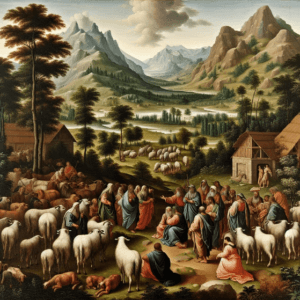 The strife no more produced the worldliness in Lot than it produced the faith in Abraham; it only manifested, in the case of each, what was really there. The Canaanite and the Perizzite observed this “strife,” as they always observe such.
The strife no more produced the worldliness in Lot than it produced the faith in Abraham; it only manifested, in the case of each, what was really there. The Canaanite and the Perizzite observed this “strife,” as they always observe such.
What did they see?
God had blessed Abram and Lot abundantly, including in the size of their herds of livestock. According to this verse, that growth has gotten to the point where their herdsmen were quarreling over resources.
Even the most fertile land can only support so many livestock and people. One can imagine herdsmen from either family trying to graze and water their flocks in the same areas, fighting over the right to those fields.
Once Lot and Abram’s combined tribes became large enough, the only real option was to split up to prevent stagnation.
Though there was room to spread out in the area around Bethel, the land was not empty. This verse reminds us that it was occupied both by the Canaanites and a people group called the Perizzites.
This is part of the land God has promised to Abram’s descendants (Genesis 12:7), but for the time being, it is under the control of a different culture.
Genesis 13:8 KJV
And Abram said unto Lot, Let there be no strife, I pray thee, between me and thee, and between my herdmen and thy herdmen; for we be brethren.
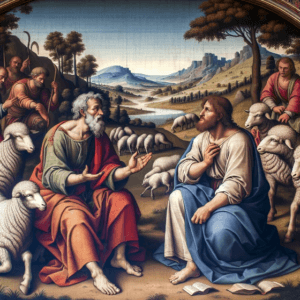 The bent toward Sodom is now beginning to exert itself in the heart of Lot. This “bent” demands its “rights,” which demands to be able to choose for itself, which, at the same time, means that it does not trust God to make the choice.
The bent toward Sodom is now beginning to exert itself in the heart of Lot. This “bent” demands its “rights,” which demands to be able to choose for itself, which, at the same time, means that it does not trust God to make the choice.
Previous verses revealed a conflict had between Abram’s servants and Lot’s servants. Both had extremely large herds of animals, and there simply was not room for them to occupy the same limited space when they had settled around Bethel.
Abram didn’t want conflict with his kinsman Lot, his brother’s son. He didn’t want any reason to quarrel to exist between them. So Abram begins, in this verse, to propose a solution.
Genesis clearly shows that Abram has a soft spot in his heart for Lot. His nephew is mentioned as part of Abram’s original traveling entourage (Genesis 12:4).
Abram will later rescue Lot from kidnappers in a full-blown military raid (Genesis 14:1–16).
After taking the name Abraham, Abram will plead with God on behalf of Lot’s hometown of Sodom (Genesis 18:22–33).
The offer made in the next verse is yet another example of Abram’s gracious love for Lot. That offer turns the normal convention of seniority—or the rights of the elder—upside down.
Genesis 13:9 KJV
Is not the whole land before thee? separate thyself, I pray thee, from me: if thou wilt take the left hand, then I will go to the right; or if thou depart to the right hand, then I will go to the left.
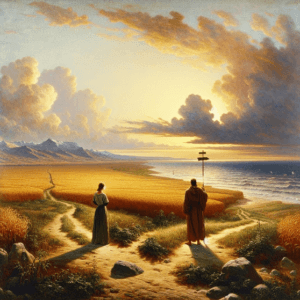 This was a test for both Abraham and Lot.
This was a test for both Abraham and Lot.
Abram is proposing a solution to end the quarreling between his herdsmen and Lot’s herdsmen. The reason for the budding feud was due to the limited space available for both of their large herds of animals.
According to this passage, God has blessed Abram and his family abundantly, and this includes Lot (Genesis 13:5–6). Even the richest landscape can only support so many men and animals.
To keep the ever-growing families from bickering over resources, Abram suggests that they split up and settle in separate regions.
To ensure that there is no reason for Lot or Lot’s servants to claim that Abram has taken the best land for himself, Abram generously gives Lot the choice of which parcel of land to occupy.
This is a remarkably humble gesture on the part of Abram. As the elder, he would have had the right of first choice.
Granting this advantage to Lot is not only generous, it reinforces the unique fondness Abram seems to have for his nephew. The following verses reveal Lot’s self-serving choice, which will prove to be quite fateful.
I hope that you have really enjoyed this post,
Please Leave All Comments in the Comment Box Below ↓

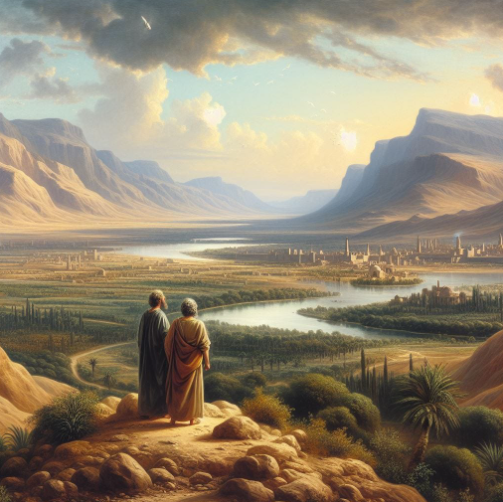











Thank you for sharing this insightful commentary on the separation of Abraham and Lot in Genesis 13.
It’s interesting to see how this passage highlights the consequences of their prosperity and the challenges it posed for their coexistence.
One aspect that stands out is Abram’s faithfulness and his willingness to prioritize peace and harmony over personal gain. Despite being the elder and having the right to choose first, Abram selflessly gives Lot the opportunity to select the land he desires.
This act of humility and generosity reflects Abram’s character and his desire to avoid any conflict or strife within their family.
Hello Anoth,
Thanks for taking the time to stop by and comment on another HBS & DwJ Podcast episode.
I agree with you that Abram’s faithfulness and his willingness to prioritize peace and harmony over personal gain definitely stands out.
I am very thankful that you recieve this study as insightful commentary of the biblical text.
Please stop by again,
Blessings My Friend!
I agree with your comment that it is significant that God does not appear to Abram until he returns to the land of Canaan and separates from Lot.
This suggests that God is not pleased with Abram’s decision to lie to Pharaoh about Sarai and that he needs to make some changes before he can be in the right relationship with God.
It is also a reminder that we need to be willing to let go of the things that are holding us back from our full potential. If we are to truly follow God, we need to be willing to put aside our own desires and ambitions and focus on His Will for our lives.
Thank you for sharing this passage with me. It is a reminder of the importance of our relationship with God and the choices we make in life.
Hello again Jeffrey,
As always, thank you for continuing to be a part of this HBS & DwJ Platform.
Your comment reminds me of how, after giving my life to Christ, I have discovered and enjoyed many Blessings. The truth is, He has been Blessing me all along, but I was then aware of them in a way that I never had realized before. Oh, I must not forget the abundant mercy that He constantly offers.
I believe giving our life to Christ is one of the most important decisions we’ll ever have to make.
Thank you again for stopping by,
Blessings My Friend!
Wow,
I’m really grateful for your thoughtful analysis of the Abraham and Lot separation in Genesis 13!
I enjoyed it a lot. What caught my attention was Abram’s commitment to staying faithful and choosing peace and unity over personal interests. It’s remarkable how he, as the elder, allowed Lot to make the first choice of land, putting aside any selfish desires.
This passage truly sheds light on the impact of prosperity on their relationship and how they dealt with the challenges it brought.
This demonstration of humility and generosity speaks volumes about Abram’s character and his strong desire to keep their family free from any conflicts or disagreements.
Hello Sandro,
Welcome back to the HBS & DwJ Platform, and thanks again for taking the time to stop by and comment on yet, another HBS & DwJ Podcast episode.
You are welcome for my thoughtful analysis about The Abram And Lot Separation – Abram’s Rich Return From Egypt. I really appreciate you considering this information interesting.
This is why I decided to start this platform in the first place. I want to reach those who are interested in the biblical information that I have to share, as well as, recieve the biblical information they have to share.
I am also thankful that it peaks your interest at all. Please come back and visit this website, the podcast, and the store at anytime.
Thanks again,
Blessings My Friend!
This blog post provides an insightful analysis of Genesis 13, focusing on Abram’s return from Egypt and his separation from Lot.
The author highlights the significance of Abram’s return to the Land of Promise and the appearance of God to him after his separation from Lot.
The post also discusses the consequences of Lot’s choice to live near Sodom and the expansion of God’s promises to Abram. The author emphasizes the themes of faithfulness, consequences, and the importance of seeking God’s guidance.
Overall, this post offers a thought-provoking interpretation of the passage and provides valuable insights into the story of Abram and Lot.
Hello again Alice,
Thanks for continuing to stop by the HBS & DwJ website, turned podcast to comment on additional episodes.
Please feel free to continue to stop by and share your thoughts on other information on this HBS & DwJ website anytime, your perspective is definitely welcomed.
Your opinion on this topic, as well as the others you commented on, is very much appreciated.
Blessings To You My Friend!
The account of Abraham’s separation from Lot provides a fascinating insight into the dynamics of relationships, wealth, and God’s guidance.
The juxtaposition of Abraham’s return from Egypt and the subsequent separation from Lot highlights the divine presence and intervention in their lives. The conflict between their herdsmen and the scarcity of resources emphasize the challenges that abundance can bring.
Abraham’s willingness to let Lot choose his portion of land showcases his humility and his concern for maintaining harmony. It’s intriguing how Abraham’s actions are not only a response to their situation but also a reflection of his character and faith.
This narrative serves as a reminder of the complexities and choices that arise when blessings and material wealth are abundant.
Hello Ashley,
Welcome back to the HBS & DwJ Platform, and thanks for taking the time to stop by and comment on this HBS & DwJ Podcast episode, as well as considering it two things being seen or placed close together with contrasting effect.
Feel free to listen to the HBS & DwJ Podcast on iHeart, Apple Podcast, YouTube, or where-ever you get your podcast.
Blessings To You My Friend!